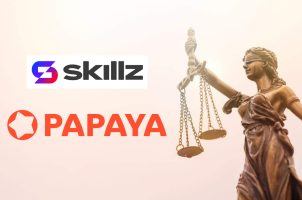Michigan Regulators Order Prominent Online Skill Gaming Platform to Cease and Desist
Posted on: October 3, 2024, 12:25h.
Last updated on: October 3, 2024, 04:10h.
On Thursday, the Michigan Gaming Control Board (MGCB) ordered a leading online facilitator of supposedly peer-to-peer skill gaming contests to cease business in the state.

Israel-based Papaya Gaming claims to operate skill games on its mobile apps. Players stake wagers before competing head-to-head in titles like Solitaire Cash, Bubble Cash, Bingo Cash, and 21 Cash.
Papaya has been accused of utilizing computer bots by rival Skillz. A class-action lawsuit brought against Papaya by disgruntled customers levied similar accusations.
The MGCB said today an internal probe of Papaya’s mobile platform was initiated after an anonymous tip was received expressing concern that the online gaming company was violating Michigan’s gambling laws. The investigation determined that Papaya is operating illegal gambling by offering its supposedly skill-based products.
The Michigan Gaming Control Board firmly believes in a regulated and safe gaming environment,” said MGCB Executive Director Henry Williams. “Illegal gambling is not tolerated in Michigan, and we will take all necessary actions to protect our residents from such unlawful practices.”
In its cease-and-desist order, the gaming regulator said the mobile gaming company must exit the state within 14 days or face legal action.
Papaya told Casino.org it is reviewing the MGCB letter.
Papaya complies with all applicable laws and regulations in the jurisdictions in which it operates. We look forward to addressing the matter in due course with the Michigan Gaming Control Board. We are confident that Papaya will continue to present lawfully in Michigan,” the statement read.
Unlawful Gaming
Michigan gaming regulators said the evidence showed that Papaya’s business violated the Michigan Gaming Control and Revenue Act and the Michigan Penal Code. A party who operates an unlicensed gambling operation in Michigan faces a felony punishment of up to 10 years in prison and fines of up to $100K.
Papaya rejects claims that it uses computer bots or is a gambling operator. In a statement to Casino.org in August, the company claimed Skillz is running a smear campaign against its competitors.
“Skillz has engaged in a pattern of tortious and deceptive conduct. The counterclaims describe how — with its business performing poorly — Skillz embarked on a deceitful campaign against Papaya by falsely claiming that Skillz is a virtuous crusader for fairness while accusing others of the same type of deceitful conduct they are engaging in themselves. That behavior is the height of hypocrisy,” the statement read.
Skillz’s federal complaint against Papaya is ongoing in New York’s Southern District. A similar Skillz lawsuit against Paris-based Voodoo Gaming remains active in the same federal courthouse.
Attorneys for Papaya and Voodoo, a spokesperson representing Skillz told Casino.org, are trying “to shield themselves with the law of foreign countries.”
“They’re using different tactics, but the bottom line is that both are hiding behind foreign law to avoid revealing what they’re up to,” the public relations person said.
Competitors Remain Active
Casino.org reached out to the MGCB for clarity about whether AviaGames, another supposedly peer-to-peer skill gaming network that’s faced similar legal scrutiny from Skillz and consumers in recent years, but didn’t hear back as this report went live. Voodoo’s operations remain live in Michigan, too.
Las Vegas-based Skillz was a pioneer of the online head-to-head skill gaming industry. Founded in 2012, Skillz has since become a business-to-business service provider that lends its patented “software development kit” (SDK) to skill gaming mobile game developers, including Avia.
In February, a federal jury in California’s Northern District Court ordered Avia to pay Skillz $42.9 million for willful infringement of the SDK. Skillz successfully argued that Avia had modified the SDK to allow “historical playthroughs.” A juror told Casino.org that the jury believed the “historical playthrough” term was coined by Avia solely for its legal defense.
Avia argued it didn’t utilize bots but instead, provided quicker player pairing times by utilizing a player’s previous gameplay for a new game. The jury reasoned that “historical playthroughs” was code for bots among Avia’s operations.
Related News Articles
Skillz Gaming CEO Alleges AviaGames Copied Patented Technology
Papaya Gaming Rejects Bot-Use Claims Alleged in Skillz Lawsuit
Most Popular
FTC: Casino Resort Fees Must Be Included in Upfront Hotel Rates
Genovese Capo Sentenced for Illegal Gambling on Long Island
NBA Referees Expose Sports Betting Abuse Following Steve Kerr Meltdown
UPDATE: Former Resorts World & MGM Grand Prez Loses Gaming License
Most Commented
-
UPDATE: Whiskey Pete’s Casino Near Las Vegas Closes
— December 20, 2024 — 30 Comments -
Caesars Virginia in Danville Now Accepting Hotel Room Reservations
— November 27, 2024 — 9 Comments -
UPDATE: Former Resorts World & MGM Grand Prez Loses Gaming License
— December 19, 2024 — 8 Comments -
FTC: Casino Resort Fees Must Be Included in Upfront Hotel Rates
— December 17, 2024 — 7 Comments
















No comments yet